|
|
|
Sort Order |
|
|
|
Items / Page
|
|
|
|
|
|
|
| Srl | Item |
| 1 |
ID:
132772
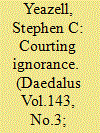

|
|
|
|
|
| Publication |
2014.
|
| Summary/Abstract |
Most of the United States' judicial work takes place in the country's state trial courts. These tribunals preside over everything from traffic tickets to murder trials, from routine debt collection to massive environmental torts. Given their expansive role, the manner in which these courts function is of immense significance. But ultimately, we know very little about these institutions. Our ignorance flows both from trivial bureaucratic turf battles and from deeply rooted principles of local government, a phenomenon I have called "data federalism." In the last few decades, we have begun to form a partial image of the activities of these organs of government; but we know almost nothing about their past, and the little we do know suggests the dangers of extrapolation. This essay explores the extent of our ignorance of state trial courts and the difficulties of overcoming it.
|
|
|
|
|
|
|
|
|
|
|
|
|
|
|
|
| 2 |
ID:
121797


|
|
|
|
|
| Publication |
2013.
|
| Summary/Abstract |
Empirical analyses of domestic legal traditions in the social science literature demonstrate that common law states have better economic freedoms, stronger investor protection, more developed capital markets, and better property rights protection than states with civil law, Islamic law, or mixed legal traditions. This article expands upon the literature by examining the relationship between domestic legal traditions and human rights practices. The primary hypothesis is that common law states have better human rights practices on average than civil law, Islamic law, or mixed law states because the procedural features of common law such as the adversarial trial system, the reliance on oral argumentation, and stare decisis result in greater judicial independence and protection of individual rights in these legal systems. We also examine how the quality of a state's legal system influences repression focusing on colonial legacy, judicial independence, and the rule of law. A global cross-national analysis of state-years from 1976 to 2006 shows that states with common law traditions engage in better human rights practices than states with other legal systems. This result holds when controlling for the quality of the legal system and standard explanations for states' human rights practices (economic growth, regime type, population size, military regime, and war involvement).
|
|
|
|
|
|
|
|
|
|
|
|
|
|
|
|
| 3 |
ID:
114494


|
|
|
|
|
| Publication |
2012.
|
| Summary/Abstract |
Forum non conveniens is a popular doctrine in common law jurisdictions but it is generally unacceptable in civil law. Historically, China is a country of civil law tradition and Chinese law accordingly does not recognize this doctrine. Nevertheless, this doctrine has gradually attracted more and more Chinese lawyers' attention and been de facto applied by some Chinese courts in the past decades. A systematic survey of Chinese courts' practice, however, demonstrates that compared with those in the United States and United Kingdom, the Chinese version of this doctrine is quite limited, which is consistent with the Chinese jurisdictional background and judicial reality. Looking to the future, this doctrine should be formally accepted by Chinese law and more details on its application need be worked out.
|
|
|
|
|
|
|
|
|
|
|
|
|
|
|
|
| 4 |
ID:
093050
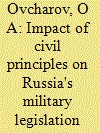

|
|
|
| 5 |
ID:
132753
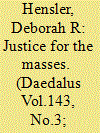

|
|
|
|
|
| Publication |
2014.
|
| Summary/Abstract |
Traditionally, disputes over injury compensation that were brought to court involved one or a few plaintiffs and defendants and were processed individually. The risk and expense of such litigation meant that most victims of legally cognizable injuries never came through the courthouse doors. The modern global economy, however, has vastly increased the potential for mass harms and losses, and modern mass media have created felicitous circumstances for mass claiming. Aggregated mass litigation blasts open the courthouse doors for individuals who might otherwise find them closed. Aggregation benefits some but disadvantages others. Class action rules attempt to mitigate these conflicts, but such procedures do not apply to aggregate non-class litigation. It is time for courts to adopt rules and practices that recognize the realities of such litigation.
|
|
|
|
|
|
|
|
|
|
|
|
|
|
|
|
| 6 |
ID:
132760
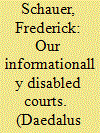

|
|
|
|
|
| Publication |
2014.
|
| Summary/Abstract |
In order to carry out their functions of deciding particular cases and developing legal rules and principles, courts need information: not just information about the law, but also factual information about the particular matter in controversy and about the world in general. The way in which courts are structured, however, makes it more difficult for them to obtain the information they need than it is for most other public decision-making institutions. As the world becomes more complex, and as sophisticated scientific, technical, and financial information becomes more central to litigation and to the judicial function, the systemic disabilities of the courts in obtaining the information they need become more apparent and increasingly more problematic.
|
|
|
|
|
|
|
|
|
|
|
|
|
|
|
|
| 7 |
ID:
158063


|
|
|
|
|
| Summary/Abstract |
Civil rights of the minorities, substantially framed in the Lausanne Peace Treaty in 1923, were subjected to secular regulation with the Civil Code issued in 1926 in Turkey. The annulment of the Lausanne provisions was justified with collective petitions penned by representatives of the non-Muslim communities. The collective petitions, called ‘mahzar’, constituted the legal pretext by which the non-Muslim communities were reconciled with the secularizing civil code of government. This article unravels the manuscripts of ‘mahzars’ and sheds light on the political backdrop whereby non-Muslim minorities renounced their rights in Article 42. Drawing on the scripts of mahzars, it tracks the justification and arguments made by the disclaimers of non-Muslim communities. It also delineates the debate on the act of renunciation by examining the transcripts of the negotiations at Lausanne Peace Conference and the internal and international press. Despite standing for the consent of the non-Muslim minorities, the collective petitions, this article argues, embodied hegemonic means of government to subdue minority rights.
|
|
|
|
|
|
|
|
|
|
|
|
|
|
|
|
| 8 |
ID:
132749
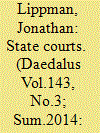

|
|
|
|
|
| Publication |
2014.
|
| Summary/Abstract |
In New York, millions of civil litigants each year fight for the necessities of life without the aid of a lawyer because they are unable to afford one. While the state courts strive to provide access to justice for all constituents, this ideal becomes a promise unfulfilled due to the lack of available civil legal services for low-income populations. In this essay, I discuss access to justice in the state courts from the perspective of my role as Chief Judge of the State of New York. I examine the enormity of the unmet need in New York and around the country and discuss the measures I have taken as head of the New York State court system to address the crisis. These efforts have resulted in a substantial increase in state funding for civil legal services, the establishment of the Task Force to Expand Access to Civil Legal Services in New York, annual hearings in each of New York's four Judicial Departments, and the development of programs designed to spur the legal community (including law students) to greater involvement in pro bono work.
|
|
|
|
|
|
|
|
|
|
|
|
|
|
|
|
| 9 |
ID:
132756
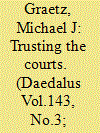

|
|
|
|
|
| Publication |
2014.
|
| Summary/Abstract |
In recent years, state courts have suffered serious funding reductions that have threatened their ability to resolve criminal and civil cases in a timely fashion. Proposals for addressing this state court funding crisis have emphasized public education and the creation of coalitions to influence state legislatures. These strategies are unlikely to succeed, however, and new institutional arrangements are necessary. Dedicated state trust funds using specific state revenue sources to fund courts offer the most promise for adequate and stable state court funding.
|
|
|
|
|
|
|
|
|
|
|
|
|
|
|
|
|
|
|
|
|